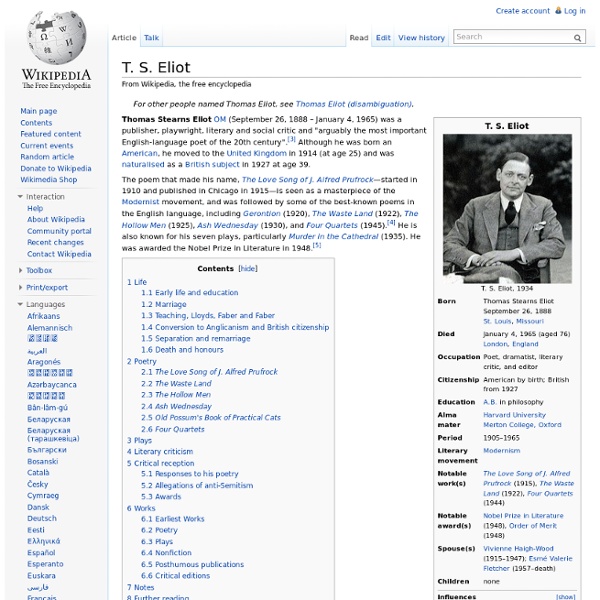



Andrea Gibson Andrea Gibson (born August 13, 1975) is an award-winning poet and activist who lives in Boulder, Colorado. Her poetry focuses on gender norms, politics, social reform and the struggles LGBTQ people face in today's society. On top of using poetry to express what she feels and provide social and political commentary on real issues, she is involved with many activist groups. Gibson grew up in Calais, Maine. In 2011, Write Bloody Publishing published Andrea Gibson's 6th book, "The Madness Vase". Discography[edit] Bullets and Windchimes (2003)Swarm (2004)When the bough breaks (2006)Yellowbird (2009)Flower Boy (2011)Truce (2013) Yellowbird, her third most recent album, incorporates music and song throughout the album. On August 29th 2013 Andrea announced through social media that she will be releasing a new album titled "Truce" in early October 2013. References[edit] External links[edit]
Henry David Thoreau Henry David Thoreau (see name pronunciation; July 12, 1817 – May 6, 1862) was an American author, poet, philosopher, abolitionist, naturalist, tax resister, development critic, surveyor, and historian. A leading transcendentalist,[2] Thoreau is best known for his book Walden, a reflection upon simple living in natural surroundings, and his essay Resistance to Civil Government (also known as Civil Disobedience), an argument for disobedience to an unjust state. Thoreau's books, articles, essays, journals, and poetry total over 20 volumes. Among his lasting contributions are his writings on natural history and philosophy, where he anticipated the methods and findings of ecology and environmental history, two sources of modern-day environmentalism. Name pronunciation and physical appearance[edit] In appearance he was homely, with a nose that he called "my most prominent feature Life[edit] Early life and education, 1817–1836[edit] Return to Concord, 1836–1842[edit] Later years, 1851–1862[edit]
Jack Kerouac Jean-Louis "Jack" Kérouac (/ˈkɛruːæk/ or /ˈkɛrɵæk/; March 12, 1922 – October 21, 1969) was an American novelist and poet. He is considered a literary iconoclast and, alongside William S. Burroughs and Allen Ginsberg, a pioneer of the Beat Generation.[2] Kerouac is recognized for his method of spontaneous prose. Thematically, his work covers topics such as Catholic spirituality, jazz, promiscuity, Buddhism, drugs, poverty, and travel. He became an underground celebrity and, with other beats, a progenitor of the hippie movement, although he remained antagonistic toward some of its politically radical elements.[3][4] Biography[edit] Early life and adolescence[edit] Jack Kerouac was born on 9 Lupine Road in the West Centralville section of Lowell Massachusetts, 2nd floor. Jack Kerouac was born in Lowell, Massachusetts, to French-Canadian parents, Léo-Alcide Kéroack and Gabrielle-Ange Lévesque, of St-Hubert-de-Rivière-du-Loup in the province of Quebec, Canada. Early adulthood[edit]
Giovanni Quessep Giovanni Quessep Esguerra (San Onofre, 31 de diciembre de 1939) es un poeta colombiano. Quessep es descendiente de abuelos libaneses que emigraron al país a finales del siglo XIX, huyendo de la persecución del imperio otomano. Biografía[editar] El apellido original era Quessed, pero durante los trámites burocráticos terminó por escribirse con P final. En 1949, su familia tiene que abandonar San Onofre durante el periodo de Violencia bipartidista en Colombia. Después de sus estudios secundarios, viaja a Bogotá y estudia Filosofía y Letras en la Universidad Javeriana y más tarde realiza un postgrado de Literatura Hispanoamericana en el Instituto Caro y Cuervo. En 1961 publica su primer libro, Después del paraíso, libro convencional, ceñido a la métrica y a la rima del soneto, que lo distanció de sus contemporáneos nadaístas. Acerca del Autor[editar] Según James J. Obras[editar] Premios y distinciones[editar] Notas y referencias[editar] Enlaces Externos[editar]
André Breton André Breton (Tinchebray, 19 de febrero de 1896 - París, 28 de septiembre de 1966), escritor, poeta, ensayista y teórico del Surrealismo, reconocido como el fundador y principal exponente de este movimiento artístico. Biografía[editar] De origen modesto, comenzó a estudiar medicina desoyendo las presiones familiares (sus padres querían que fuera ingeniero). Durante la guerra trabajó en hospitales psiquiátricos, donde estudió las obras de Sigmund Freud y sus experimentos con la escritura automática (escritura libre de todo control de la razón y de preocupaciones estéticas o morales), lo que influyó en su formulación de la teoría surrealista. Fundó con Louis Aragon y Philippe Soupault la revista Littérature. Muy pronto el movimiento se acerca a la política y en 1927 Aragon, Éluard y Breton se afilian al Partido Comunista. Octavio Paz, que conoció a Breton cuando llegó a París en 1946, cuenta que el fundador del surrealismo tenía dos caras. André Breton. Obras[editar] Ensayos[editar]
Hermann Hesse Biography[edit] Family background[edit] Hermann Hesse was born on 2 July 1877 in the Black Forest town of Calw in Württemberg, German Empire. His parents served in India at a mission under the auspices of the Basel Mission, a Protestant Christian missionary society. Hesse's mother, Marie Gundert, was born at such a mission in India in 1842. In describing her own childhood, she said, "A happy child I was not..." Hesse's birthplace, 2007 Hesse's father, Johannes Hesse, the son of a doctor, was born in 1847 in the Estonian town of Paide (Weissenstein). Hesse grew up in a Swabian Pietist household, with the Pietist tendency to insulate believers into small, deeply thoughtful groups. Childhood[edit] From childhood, Hesse appeared headstrong and hard for his family to handle. St. Young Hesse shared a love of music with his mother. Education[edit] After this, Hesse began a bookshop apprenticeship in Esslingen am Neckar, but quit after three days. Becoming a writer[edit] Casa Camuzzi[edit]